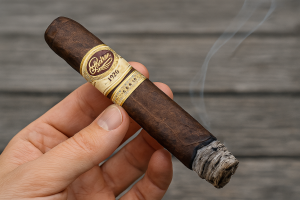How Long Does It Take To Smoke A Cigar: Embracing the Enjoyment

When it comes to smoking cigars, time is more than just a number; it's an integral part of the experience.
The duration of smoking a cigar can vary widely depending on several factors, including the size and type of the cigar, the smoker's personal habits, and even the environment in which the cigar is smoked.
To help both novice and experienced smokers understand how long does it take to smoke a cigar, we decided to show you everything that influences the perfect duration, so let’s jump into it.
- Type of Cigar Reveals How Long It Takes to Smoke It
- The Impact of Cigar Composition
- Smoking Technique and Pace
- Environmental Factors Affecting Cigar Smoking Time
- The Importance of Taking Your Time
Type of Cigar Reveals How Long It Takes to Smoke It
The physical dimensions of a cigar play a crucial role in determining how long it will last. Cigars come in various sizes and shapes, often referred to as vitolas.
For instance, a smaller cigar like a Petit Corona might take about 20-30 minutes to smoke, while a larger one like a Churchill can last upwards of an hour or more.
Cigar smoking times can vary greatly depending on several factors, including the size and type of the cigar. Here's a general guideline:
- Petit Corona (4.5 inches, 40-42 ring gauge): About 20-30 minutes.
- Robusto (4.8-5.5 inches, 48-52 ring gauge): Around 30-45 minutes.
- Corona (5.25-6 inches, 42-44 ring gauge): Approximately 30-45 minutes.
- Churchill (6.5-7 inches, 46-50 ring gauge): About 45-60 minutes.
- Double Corona (7.5-8.5 inches, 49-52 ring gauge): Typically 60-90 minutes.
- Panatela (6-7 inches, 34-38 ring gauge): Around 30-45 minutes.
- Lonsdale (6.5 inches, 42 ring gauge): Approximately 45-60 minutes.
- Toro (6 inches, 50 ring gauge): About 45-60 minutes.
- Gigante (6 inches or more, 60+ ring gauge): Can last for over 90 minutes.
The Impact of Cigar Composition
Apart from size and shape, the composition of a cigar also influences how long it takes to smoke. The type of tobacco used, its origin, and how the cigar is constructed - whether it's hand-rolled or machine-made - contribute to the burning rate and overall smoking time.
The density of the roll and the moisture content of the tobacco are particularly significant, as tightly packed or moist cigars tend to burn slower.
Smoking Technique and Pace
Every smoker has a unique style and pace. Some prefer taking leisurely, spaced-out puffs, which can extend the smoking time, while others might smoke more rapidly.
It's important to find a balance that suits your preference without overheating the cigar, as this can alter its flavor profile and overall smoking experience.
Environmental Factors Affecting Cigar Smoking Time
External factors like wind, humidity, and ambient temperature can also affect how long a cigar lasts.
Smoking outdoors on a windy day might cause the cigar to burn faster, while high humidity can slow down the burning process.
Smokers should be mindful of these conditions and adjust their smoking habits accordingly.
The Importance of Taking Your Time
Finally, it's crucial to emphasize that smoking a cigar should be a leisurely and enjoyable experience.
Rushing through a cigar not only affects its taste and can lead to an unpleasant experience but also disregards the art and tradition behind cigar smoking.
Savoring each puff, taking the time to appreciate the flavors and aromas, and enjoying the moment are what make cigar smoking a unique and cherished pastime.















